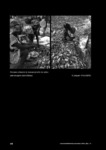Lixo Marinho: os suspeitos do costume na costa de Vila do conde

Ver/
Use este enlace para citar
http://hdl.handle.net/2183/25665
A non ser que se indique outra cousa, a licenza do ítem descríbese como Atribución-CompartirIgual 4.0 España
Coleccións
Metadatos
Mostrar o rexistro completo do ítemTítulo
Lixo Marinho: os suspeitos do costume na costa de Vila do condeTítulo(s) alternativo(s)
Marine Garbage: The Usual Suspects on the Coast of Vila do CondeData
2019Cita bibliográfica
Laranja, A. (2019). Diseminación da ciencia. AmbientalMENTEsustentable, 26(1-2), 57-63. https://doi.org/10.17979/ams.2019.26.1-2.6551
Resumo
[Resumo] O CMIA de Vila do Conde funciona como Centro Azul para o Programa Bandeira Azul, pelo oitavo ano consecutivo, promovendo diversas ações de sensibilização e educação ambiental durante a época balnear no concelho de Vila do Conde. Os plásticos são o grande flagelo e para ajudar a sensibilizar para esta causa, sob o mote de que todos os gestos são importantes, o CMIA dinamizou a atividade “Os Suspeitos do Costume”, que tem como objetivo a recolha e identificação dos resíduos mais frequentes em cada praia, e a reflexão sobre as suas origens, impactos e formas de os reduzir. Esta atividade, decorreu de abril a julho de 2018, com 10 ações de limpeza e cerca de 200 voluntários, tendo-se procedido à recolha de cerca de 95kg dos suspeitos do costume (resíduos). Os resultados mostraram que os principais suspeitos na nossa costa são: cotonetes, beatas, palhinhas, garrafas de plástico, tampas e plásticos fragmentados. A reflexão sobre possíveis contributos para a redução do lixo marinho aponta para a palavra de ordem RECUSAR. [Abstract] For the eighth consecutive year, the CMIA of Vila do Conde works as a Blue Center for the Blue Flag Program, promoting several actions to raise awareness and environmental education during the bathing season in the municipality of Vila do Conde. Plastics are the great scourge and to help raise awareness of this cause, the CMIA revitalized the activity “The Suspects of Custom”, which aims to collect and identify the most frequent waste on each beach, and reflection on their origins, impacts and ways to reduce them. This activity took place from April to July 2018, with 10 cleaning actions and about 200 volunteers, with the collection of about 95kg of the usual suspects (waste). The results showed that the main suspects on our coast are: cotton swabs, cigarette butts, straws, plastic bottles and fragmented plastics. The reflection on possible contributions for the reduction of marine litter points to the word REFUSE.
Palabras chave
Plásticos
Recusa
Educação ambiental
Ciência cidadã e literacia científica
Plastic
Refuse
Environmental education
Citizen science and scientific literacy
Recusa
Educação ambiental
Ciência cidadã e literacia científica
Plastic
Refuse
Environmental education
Citizen science and scientific literacy
Versión do editor
Dereitos
Atribución-CompartirIgual 4.0 España
ISSN
1887-2417






